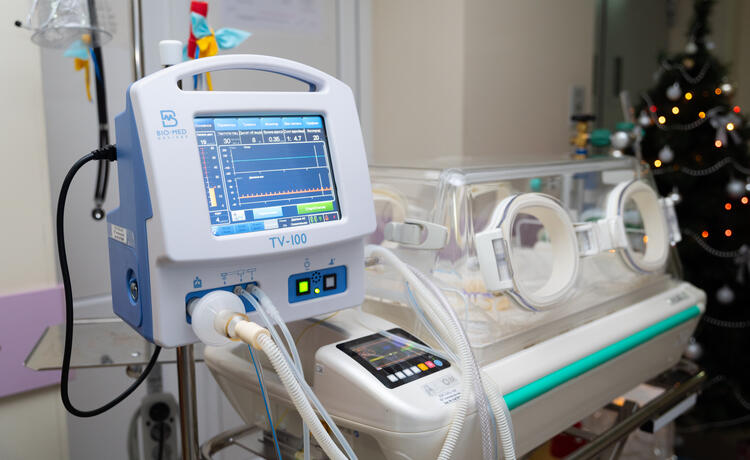News
Giving birth on Ukraine’s front line: How women and medical workers are coping under fire
- 01 July 2024
News
ODESA, Ukraine – Like many expecting parents, Oleksandra and Oleksandr Chebotar were eagerly awaiting the birth of their daughter. The way it happened, however, was unlike anything they had ever imagined.
In the port city of Odesa in southern Ukraine, the couple had gone to Maternity Hospital No. 5 – a facility known for its comprehensive maternity care and which had previously earned local fame as the birthplace of quintuplets. But just after Ms. Chebotar delivered her baby, an air raid alarm sounded over the city, which remains a regular target of Russian missile and drone attacks.

Using a mobile incubator, the medical team quickly moved the newborn, along with her panicked parents and other patients, to the hospital’s underground bomb shelter.
Mobile incubators are equipped to maintain optimal temperature, humidity and oxygen levels and come with artificial lung ventilation. Provided by UNFPA, the United Nations sexual and reproductive health agency, they help bridge the gaps in maternal and neonatal supplies and services that Ukraine’s hospitals are experiencing.
The human cost
The construction of new underground bunkers has proved critical in supporting and protecting pregnant women in Ukraine. Maternity Hospital No. 5 recently reinforced its air raid shelter to provide security as well as the necessary medical facilities to ensure health-care services continue uninterrupted during attacks.
Radionova Alevtyna Viktorivna had also been waiting for a prenatal check-up at the hospital when the alarm sounded. “We need secure, well-equipped spaces where women can safely continue their pregnancies, despite the ongoing threats,” she told UNFPA.
The situation in Odesa's maternity hospitals reflects a broader crisis affecting Ukraine's health-care system, which needs urgent, sustained support and global attention to improve conditions for maternity and newborn care.
The energy infrastructure in Odesa — as well as all of Ukraine — continues to come under repeated attack, leading to significant disruptions and increased costs for basic services. With power lines and generation capacities damaged, the price of electricity and heating has soared, putting further financial strain on families already struggling. These attacks not only affect daily living conditions, but also impede hospitals’ abilities to provide consistent care as critical medical equipment and services can cut out unexpectedly.
In the first six months of the year, WHO verified 160 attacks on health-care facilities across Ukraine, leaving many pregnant women and newborns with scarce access to essential services.
The health-care crisis deepens
Constant shelling has also taken a severe toll on the mental health of its residents, including pregnant women. The psychological strain exacerbates the already challenging conditions under which these women are carrying and delivering their babies.
Government resources are stretched as the conflict drags on, and essential social and health service systems are weakening. UNFPA is working to fill critical gaps, particularly in sexual and reproductive health and rights, by providing medicines and pharmaceutical supplies, medical equipment and support that are vital for women in Odesa to safely navigate pregnancy and childbirth.
Support for Maternity Hospital No. 5 has been provided as part of UNFPA’s humanitarian response activities in Ukraine, with financial support from Canada, Denmark, the European Union, France, Japan, the Republic of Korea, the Netherlands and Spain.
“We need the world to see what's happening here,” Dr. Shpak stressed. “Our mothers and babies deserve better, and we will continue to provide these essential services.”